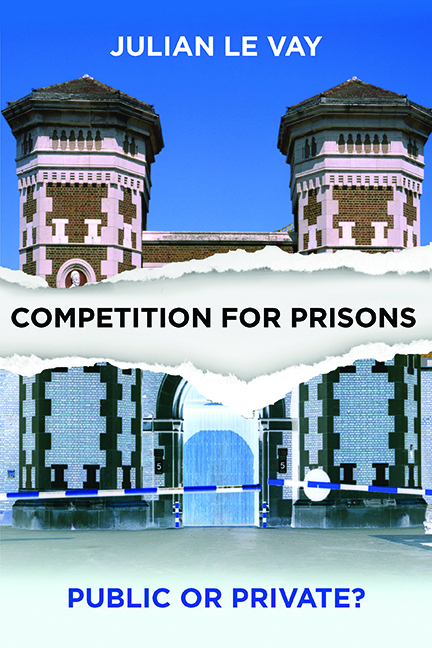Book contents
- Frontmatter
- Contents
- List of tables and figures
- List of acronyms
- Preface
- 1 Origins
- 2 Evolution
- 3 Related markets: immigration – two sectors, no competition
- 4 Youth custody
- 5 Related markets: electronic monitoring – fall of the giants
- 6 The quasi-market: characteristics and operation
- 7 Comparing public and contracted prisons
- 8 Comparing quality of service
- 9 Costing the uncostable? Civil Service pensions
- 10 Costing the uncostable? PFI
- 11 Comparing cost
- 12 Impact of competition on the public sector
- 13 Objections of principle
- 14 Related markets: probation – how not to do it
- 15 Has competition worked?
- 16 Has competition a future?
- Appendix Prescription of operating procedures in prison contracts
- Bibliography
- Index
- Frontmatter
- Contents
- List of tables and figures
- List of acronyms
- Preface
- 1 Origins
- 2 Evolution
- 3 Related markets: immigration – two sectors, no competition
- 4 Youth custody
- 5 Related markets: electronic monitoring – fall of the giants
- 6 The quasi-market: characteristics and operation
- 7 Comparing public and contracted prisons
- 8 Comparing quality of service
- 9 Costing the uncostable? Civil Service pensions
- 10 Costing the uncostable? PFI
- 11 Comparing cost
- 12 Impact of competition on the public sector
- 13 Objections of principle
- 14 Related markets: probation – how not to do it
- 15 Has competition worked?
- 16 Has competition a future?
- Appendix Prescription of operating procedures in prison contracts
- Bibliography
- Index
Summary
This chapter assesses what can be said about comparative costs between public and private sectors, taking account of the problems exposed in Chapters 9 and 10. It covers both operating costs and construction costs (and construction timescales), and considers the balance between cost and quality, including the complaint that competition must mean, or at any rate has meant, a ‘race to the bottom’.
The three different types of contract (Figure 2.1) raise different methodological issues, so are analysed separately here:
1. New ‘management only ’ contracts (where the private sector runs a prison built by the public sector). This is the ‘cleanest’ model for cost comparison, though complex adjustments are still needed for fair comparison.
2. Market tests. Comparisons are here complicated by the TUPE, which require the new operator to accept the terms and conditions of the existing workforce. This has artificially handicapped the private sector in bidding, since its own terms and conditions both pay staff less than the public sector, and get more work out of them.
3. PFI contracts. Methodological problems here were described in Chapter 10.
Some general issues about comparing costs
Bid or operating costs?
Bid costs are not a reliable guide to actual costs over the contract term, because of frequent renegotiation during the contract, such as changes in capacity or changed service requirements. For example, at Doncaster, PPS increased revenues by over 80% within six years of opening (mainly through overcrowding). This is especially an issue for the much longer PFI contracts.
Full or marginal costs?
Gaes et al (2004) argue that in assessing savings from competition, one must look only at costs actually avoided. This is certainly the case where the two sectors compete. For example, a contractor bidding to take over a public sector prison may argue that the central overheads of public sector prison service should reduce proportionately, and count as savings. But if the prison service does not reduce those overheads, that ‘saving’ must be ignored. However, full costing, including fully allocated public sector overheads, is also needed; it may suggest that central overheads should in fact be reduced, or that larger scale contracting out would reap bigger benefits by making substantial savings in the overhead possible.
- Type
- Chapter
- Information
- Competition for PrisonsPublic or Private?, pp. 159 - 196Publisher: Bristol University PressPrint publication year: 2015



